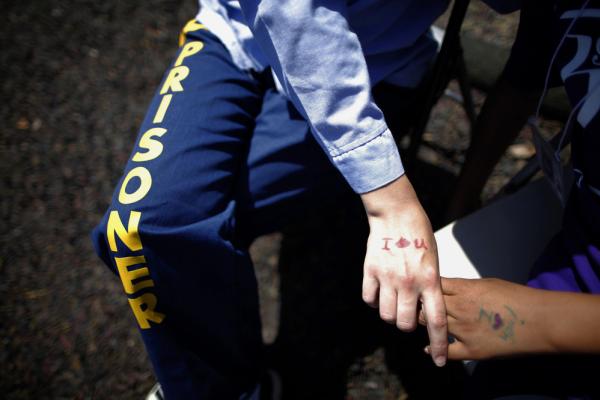In prison, your spiritual journey is regulated by paperwork.
At Lane Murray, where I’m incarcerated, a bureaucratic rule creates a peculiar dilemma for someone like me who finds truth and solace in both Christianity and Buddhism. The prison system demands I choose just one, but my soul refuses to be so neatly categorized. We’re also only allowed to change our religious affiliation once every six months. As if divine inspiration could ever follow an administrative calendar.
The irony isn’t lost one me that in a place where “rehabilitation” is supposedly the guiding principle, I am barred from seeking spiritual healing in whichever way I see fit. The chapel here stands as both a beacon and a barrier, its air-conditioned sanctuary an oasis from the Texas heat that turns our dorms into cauldrons as temperatures soar past 100 degrees. But I can’t enter without the right paperwork — without declaring Christianity as my sole official religion.
My relationship with Christianity began in childhood, where I was, as they say, thoroughly “churched out.” Catholic school shaped my early years, and during evenings and weekends, I would attend Southern Baptist services. The verses and hymns became as familiar as my own heartbeat, their rhythms and messages embedded themselves deep in my consciousness. But rather than anchoring me to a single Christian tradition or even a single religion, this intensive religious education opened my mind to broader spiritual possibilities.
As I grew older, my faith evolved into what scholars call “double belonging,” which is when a person adheres to or incorporates the practices of two different religions at the same time. I discovered that both Christianity and Buddhism helped me find meaning and truth. Like two hands working together, these two traditions complement one another. Christianity gives me the language of love, redemption, and community that I grew up with, while Buddhism offers tools for inner peace and mindfulness that proved invaluable during the eight years I spent in solitary confinement.
In that concrete box, where time seemed to stand still and human contact was minimal, Buddhist meditation practices kept me sane. The teachings about impermanence helped me understand that even this isolation would eventually end. Meanwhile, Jesus’ messages of forgiveness and love helped me maintain my humanity in a dehumanizing environment. The combination of these spiritual traditions created a foundation strong enough to support me through what could have been a mentally devastating experience.
In the hollow quiet of my cell, I’ve found sanctuary in unlikely places: in the steady rhythm of Buddhist breath work, in the familiar weight of rosary beads sliding through my fingers, and in the ancient hymns that rise unbidden from my throat. The songs of my Southern Baptist childhood emerge like old friends: “Amazing Grace,” “His Eye is on the Sparrow,” hymns that carried me through Sunday mornings are now carrying me through endless nights. When the dark tides of trauma threaten to pull me into their waters, when I witness things no human should see, I return to these practices like a drowning woman finding driftwood.
I sit cross-legged on my thin mattress, counting breaths like my meditation teacher taught me, then counting prayers like my grandmother did. Sometimes I laugh at how life has brought me here. A Detroit Catholic school student reared in a Southern Baptist tradition, now I am in a Texas prison finding peace in Buddhist wisdom and counting prayer beads.
The prison forces me to choose between my two religions. They say I can’t attend Sunday Christian services because Buddhism is listed as my religion of record. But for me, the chapel represents something beyond religious designation: It’s a portal home.
In Michigan, where my family lives, churches were cool sanctuaries during sweltering summers, places where childhood memories were formed. I’ve only seen my family twice in almost two decades, and sitting in that air-conditioned chapel, hearing the familiar cadence of hymns, transports me momentarily across the miles that separate us. The nostalgia becomes a balm for my homesickness, each familiar note easing the ache of absence. Would Jesus demand to see paperwork just so that I could experience this brief respite, this fleeting connection to my past? The Jesus I learned about welcomed all who sought comfort, never asking that people show their credentials before offering them a temporary escape from their suffering.
Once inside the chapel, the prison doesn’t allow anyone to leave — a rule that makes me deliberately careful about entering. The air conditioning beckons like a siren song during these brutal Texas summers, when temperatures in our dorms become unbearable. Yet that physical comfort comes with a spiritual price. The Christianity preached here feels incongruent with the Christianity I know. The messages come from the perspective of extreme evangelical Christian nationalism that seems more concerned with conformity than compassion.
Previously when I attended these services, I have figured out a covert way to ensure my ears would not be poisoned by this message. As the preacher begins his sermon, misusing scripture to support and promote ideas that sound eerily familiar to those found in the Heritage Foundation’s Project 2025 plan, I place foam ear plugs in my ears and return to the hymns in my head. I retreat into memories of my grandmother’s church in Detroit, where pews creaked beneath the weight of the community, where the soft rustle of Bible pages accompanied whispered prayers. In those moments of nostalgia, I’m no longer in a Texas prison but back home, surrounded by family, bubble-wrapped in cozy comfort of love and shared worship. It’s this feeling — this temporary escape through memory — that draws me to the chapel, not the distorted gospel being preached.
Caught between my hunger for these nostalgic comforts and my resistance to spiritual compromise, I’ve had to forge a path that honors both my need for connection and my commitment to authentic faith. After much reflection, I’ve found my own solution to this institutional rigidity: I will alternate my official religious affiliation every six months. So, I will follow the prison’s restrictions but do it on my own terms. Six months as a Christian during the hottest part of the year, allowing me access to the air-conditioned sanctuary and the familiar comfort of hymns. Then, six months as a Buddhist, diving deep into meditation and mindfulness practices that keep me centered despite the harsh realities of prison life.
It’s not ideal, but it’s a creative response to an inflexible system. In a way, this enforced alternation has deepened my appreciation for both traditions. It’s taught me that spiritual truth transcends administrative categories and institutional barriers. True faith, I’ve learned, doesn’t require constant access to a specific building or an official recognition. It lives in the heart, grows in the mind, and manifests in how we treat others — regardless of what the paperwork says about our religious affiliation.
Got something to say about what you're reading? We value your feedback!







